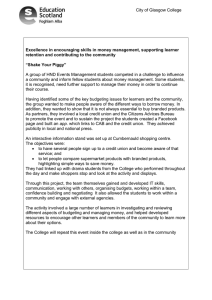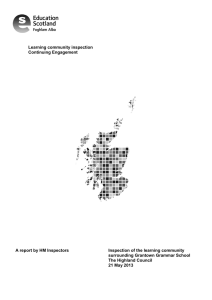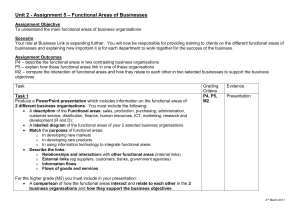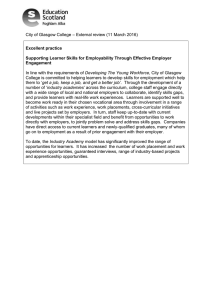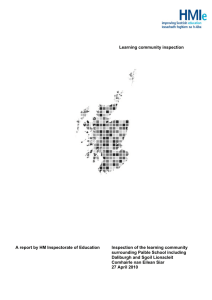Inspection of the learning community surrounding Cleveden Secondary School Glasgow City Council
advertisement
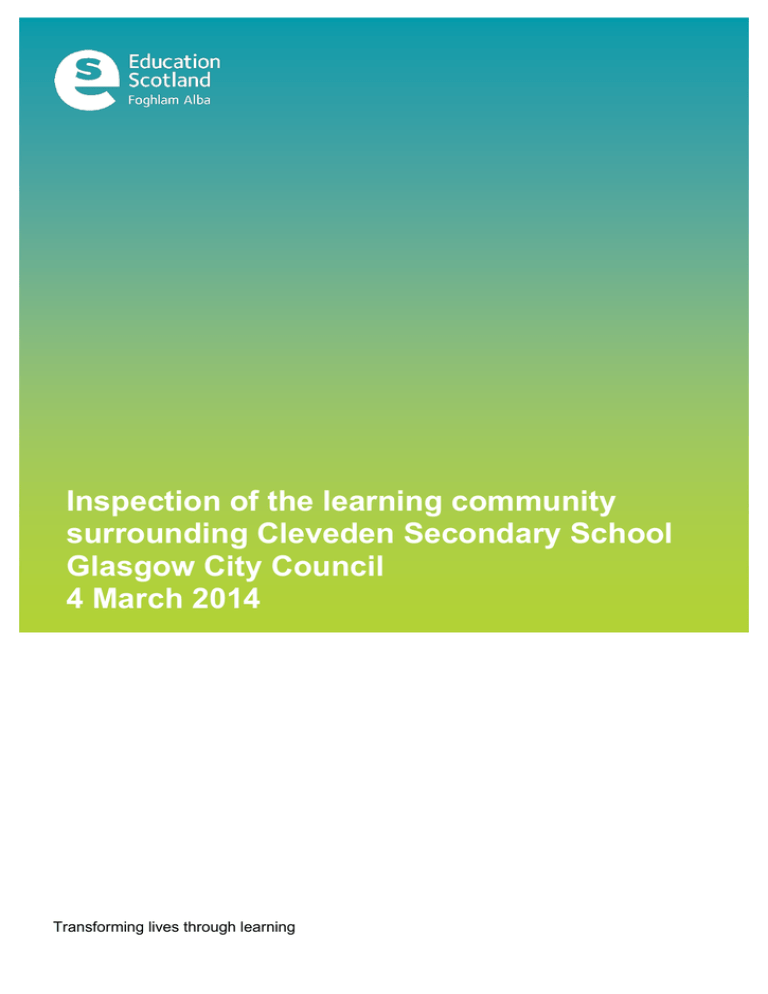
Inspection of the learning community surrounding Cleveden Secondary School Glasgow City Council 4 March 2014 Transforming lives through learning 1. Context Community learning and development (CLD) partners within the area of Cleveden Secondary School were inspected by Education Scotland during January 2014. During the visit Education Scotland staff talked to children, young people and adults. We worked closely with CLD managers, CLD providers, partners, paid staff and volunteers. We wanted to find out how well partners are improving the life chances of people living in the community through learning, building stronger more resilient communities and improving the quality of services and provision. We also looked at how well, paid staff and volunteers are developing their own practices and how well partners, including schools are working together. We looked at some particular aspects of recent work which were identified by partners including: how the wide range of partnerships work together; and improvements based on previous inspections in the wider area. 2. How well are partners improving learning, increasing life chances, promoting and securing wellbeing? Partners are working hard to meet the needs of learners and communities in this complex and diverse learning community. There are a number of city wide and area wide teams who contribute a great deal as well as high levels of local organisations and agencies. The profile for Cleveden learning community outlines the demography of the area and provides a useful set of data. Some agencies and organisations use this data well among other sources to identify their own priorities and targets, but this is variable across the learning community. There is no overall audit of the learning needs for this learning community. A large quantity of Glasgow Life data is available at a city level but much of this relates to numbers of visits to establishments, registrations and attendances at events. Information and analysis of participation at local area level and the impact of this is more limited. Glasgow Life have developed a new evaluation system to address these limitations and plan to roll out with partners in due course. Most agencies have a strong focus on working with the most high risk individuals, groups and communities. Partners deliver very targeted and effective work in relation to health and wellbeing which has substantial impacts of lives of participants. Programmes such as smoking cessation services and the drop-in youth health facility meets a wide range of adult and young people’s needs. Participants overcome territorial street issues, change risk taking behaviours, feel safe and have more respect for themselves and others. Most learners are very articulate about the impact of their learning on their lives. All partners need to build in regular discussions about progression and next steps with learners. Accreditation of learning is variable depending on the skills, experience and understanding of individual practitioners and organisations. Partners delivering Cadder Early Years Transition programme ensure that children are included, confident, achieving and effective contributors. Young people engaged in North United Communities (NUC) programmes and projects are becoming more active, included, safer and responsible through a robust, needs assessed 1 programme of youth work. This is being delivered through initiatives including streetwork, diversionary work, targeted groups, drop-in, arts projects and breakfast clubs. Youth workers are working in partnership with family support workers to address needs of targeted learners. Young people are effectively involved in the planning and pace of their learning. Shakespeare St Youth Centre, A&M training, Young Peoples Futures and other partners also offer a wide range of clubs and activities which are meeting the needs of young people. Young people attending A&M Training programmes are progressing from being participants in diversionary activities to volunteering within the organisation. They are gaining a range of accreditation such as Girls on the Move leadership certificates and Sport Leadership Awards. Almost all participants are achieving and progressing to further education or employment. The Maryhill Integration men's group provide a very effective range of targeted support services and activities for male refugees, including gardening and photography. Participants work towards accreditation and are very positive about the impact of the project in reducing isolation and building very effective support networks. North Glasgow Learns programme of family learning is having a positive impact on reducing learner isolation, increasing learner aspiration and supporting learner journeys with learners progressing into positive destinations. Adult learners with additional support needs at Artform are increasing their skills, confidence and self esteem, enabling them to self-travel and move into independent living. Some learners are also progressing onto further education courses. Community organisations are well supported by a range of specialist organisations to build capacity and sustainability. Social work services offer targeted and effective support to groups including the North Kinship carers group. Local organisations network very well informally and signpost people to each other’s services. Organisations would benefit from more opportunities to come together to share practice, skills and knowledge. There are high levels of volunteering and peer support across a wide range of organisations and settings. This is increasing the level and quality of services available for local people. There is a strong ethos of putting something back into the community, with many participants training as volunteers and supporting others. Local organisations deliver high quality services to meet local needs. Lambhill Stables Trust provide meeting spaces and leisure services which meet the needs of local people. Possil Disability Community and NUC have developed community gardens and these spaces are used as events venues and learning opportunities around health and wellbeing and the environment. 3. How well are partners working together and improving the quality of services and provision? Partners actively engage in thematic and geographic partnerships to plan and deliver services. Complex community planning arrangements and changes to structures have contributed to difficulties in communication and setting joint priorities. Organisations which cover discrete communities can find it difficult to ensure their voice is heard in debates which cover large areas of the city. Staff and volunteers 2 have a strong commitment across agencies to find solutions to work effectively together and to build on good existing relationships. Thematic partnerships, such as those around employability, have clear joint targets and deliver services very well in partnership. There are clear links between national and city wide priorities and local targets. School staff engaged in the Cleveden learning community work very well together and undertake regular joint career long professional learning which develops their shared understanding. Volunteers and staff from other organisations and agencies would benefit from participating in joint professional learning in relation to curriculum and assessment. Glasgow Life has a planned training programme which began recently to build capacity for effective self-evaluation. Staff have begun to apply frameworks systematically to identify strengths and areas for improvement. Self-evaluation is undertaken in partnership with local groups including NUC and Shakespeare St Youth Centre. There is scope for partners to strengthen and embed self-evaluation at the early planning stages of collaborative working. This inspection of learning and development in the learning community surrounding Cleveden High School found the following key strengths. High levels and good ethos of volunteering. Relationships between staff and learners and between partners. Enthusiasm of staff and volunteers to learn and improve within times of substantial change. We discussed with partners how they might continue to improve their work. This is what we agreed with them. More effective pathways and accreditation of learning. Develop a shared understanding of needs and outcomes in this learning community. Joint planning and reviewing shared outcomes for improvement across partners including schools. 4. What happens at the end of the inspection? We are satisfied with the overall quality of provision. We are confident that the learning community’s self-evaluation processes are leading to improvements. As a result, we will make no further evaluative visits in connection with this inspection. During the inspection, we identified an aspect of innovative practice which we would like to explore further. As a result we will work with the key partners and Glasgow Life in order to record and share more widely the innovative practice. Maureen Mallon HM Inspector 4 March 2014 3 Additional inspection evidence, such as details of the quality indicator evaluations, for this learning community can be found on the Education Scotland website at http://www.educationscotland.gov.uk/inspectionandreview/reports/othersectors/com munitylearninganddevelopment/ClevedenSecondarySchoollc.asp If you would like to receive this report in a different format, for example, in a translation you can contact the administration team on 01506 600381. If you want to give us feedback or make a complaint about our work, please contact us by telephone on 0141 282 5000, or e-mail: complaints@educationscotland.gsi.gov.uk or write to us, addressing your letter to The Complaints Manager, Denholm House, Almondvale Business Park, Livingston, EH54 6GA. Text phone users can contact us on 01506 600 236. This is a service for deaf users. Please do not use this number for voice calls as the line will not connect you to a member of staff. Crown Copyright 2014. Education Scotland 4

